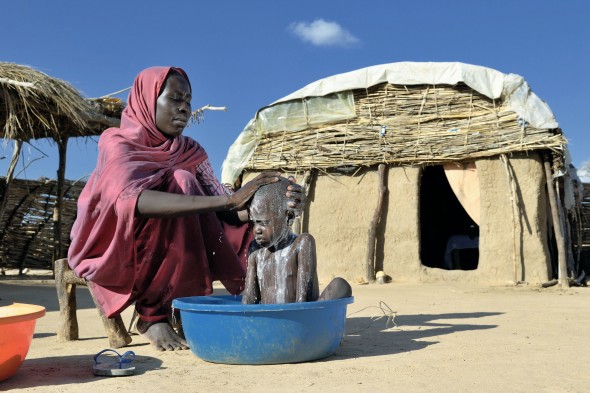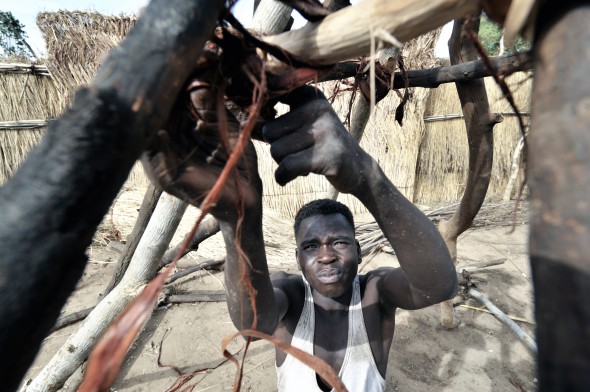Global Lens Reflections on life, the universe, and everything
Sudan: New genocide charges
Judges at the International Criminal Court in The Hague today issued a second arrest warrant against Sudan’s Preident Omar Al Bashir, charging him with three counts of genocide against the Fur, Masalit and Zaghawa ethnic groups in Darfur. The three specific charges are genocide by killing, genocide by causing serious bodily or mental harm, and genocide by deliberately inflicting on each target group conditions of life calculated to bring about the group’s physical destruction. This new charges are on top of March 2009 charges against him for crimes against humanity–murder, extermination, forcible transfer, torture and rape–and two counts for war crimes–intentionally directing attacks against a civilian population as such or against individual civilians not taking direct part in hostilities, and pillaging. (The prosecutor, Luis Moreno-Ocampo, had asked for the genocide charges before but the judges had denied them in a dispute about the standards of evidence. Today’s action comes after the Moreno-Ocampo resolved the shortcomings.)
These new charges are sure to intensify the controversy about charging a sitting president with international crimes. While rights activists are somewhat divided about whether the charges are appropriate given the dysfunctional state of the peace process for Darfur, there is widespread concern that Al Bashir will respond as he did before by lashing out at humanitarian groups, blaming them for his woes and expelling some from the country. Folks at groups like Save Darfur and the Enough Project are pushing the Obama administration to step up to the plate now and make good on its promises to stop the violence.
That violence is escalating. After a decline in overt violence in Darfur over the last couple of years (I use the word “overt” because simply maintaining almost 3 million people as prisoners in the displacement camps is definitely a kind of violence in its own right), many at the beginning of this year had relegated Darfur to being a sideshow to the brewing confrontation between Khartoum and Southern Sudan–a conflict which is likely to explode in relation to the the southern vote on secession early next year. Yet then things changed. May was the bloodiest month in Darfur in years; almost 600 people were killed, many of them in intra-Arab violence. New families were displaced. Sexual assaults are not decreasing.
It should be noted that in issuing the new indictments the ICC has not ruled that genocide has occurred in Darfur. Whether that’s the case remains a hot topic, including among people of good will who share vehement opposition to the violence in Darfur. (For a well-informed but no-holds-barred version of that debate, check out the “Making Sense of Sudan” blog hosted by Alex De Waal on the website of the Social Science Research Council.) That debate raged after the first indictments in 2009, yet most now admit that progress toward peace has accelerated, albeit in fits and starts, since the earlier court decision. Negotiations in Doha between the government and rebel groups have produced small successes, and clearly show an increased sense of urgency among groups like the Arab League and the African Union. So the argument that ICC indictments are harmful to the peace process is harder to make this time around. That’s helpful in this whole debate, where the need for justice and accountability is sometimes pushed aside in the desperate quest for an end to the bloodshed. That’s been an issue both in Sudan and in neighboring countries, such as with the Acholi in northern Uganda.
I’ve had my own frustrations with church groups that have developed an allergy to even discussing whether genocide is an appropriate term to use in relation to Darfur. While I understand the reticence of church-sponsored relief agencies to use it (whether it’s accurate or not it can jeopardize that elusive perceived neutrality), to squelch even a discussion of the issue within the church–I’ve been known to dub certain people as “genocide deniers”–is a grave mistake. Our options are not limited to simply declaring it to be genocide or declaring it to not be genocide. A more nuanced approach where we look at what’s happening in Darfur and compare that to what’s proscribed in the United Nations’ 1948 Genocide Convention will force people to listen more carefully to what has happened, reflect on what that means for the people of Darfur, and, most importantly, what that means for us–given that to formally declare something is genocide carries with it a legal (and moral) commitment to stop the genocide.
President Obama certainly has his plate full these days. Nonetheless, the new ICC charges make it clear that he’s got to make more room for Sudan. The peace process must move forward in Darfur, and the displaced must be helped–when peace does come–to return to their homes with dignity and an opportunity to truly survive and prosper. And the U.S. and others must remain vigilant that the north-south tension is worked out within the strained but not broken framework of the 2005 Comprehensive Peace Agreement. If the CPA breaks down completely, all of Sudan, including Darfur, will plunge into an even more horrible period.

